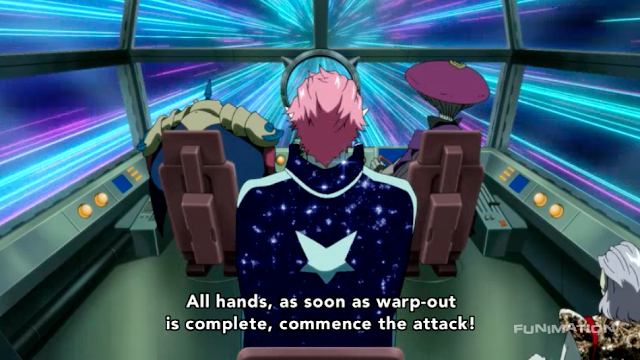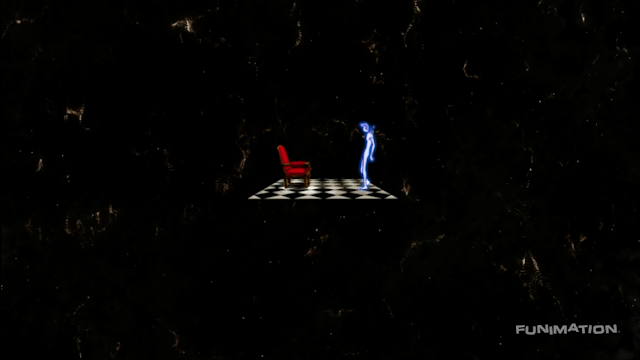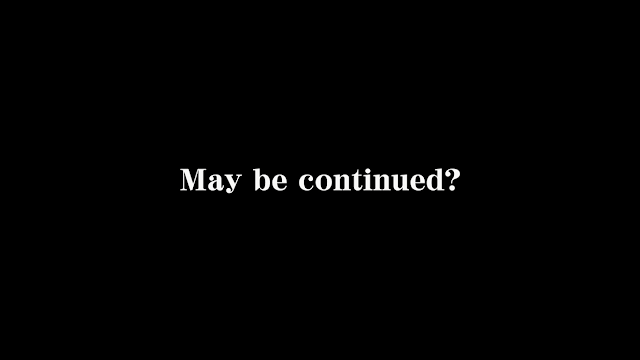This is the 100th edition of "'Brokedown Merry-Go-Round' Show of the Week" (formerly known as "5-Piece Cartoon Dinner"), in which I discuss the week's best first-run animated series episode I saw. "Brokedown Merry-Go-Round," a two-hour block of original score tracks from animated shows or movies, airs weekdays at 2pm Pacific on AFOS.
I can't believe it's taken me until "Never-ending Dandy, Baby," the final episode of Space Dandy, to finally notice that the first Japanese lyric in the opening theme "Viva Namida"--"Doko kara kita ka nante wakaranai hodo no hibi de" ("These days, I don't know where I've come from")--ties in to Dandy's lack of knowledge about his origins. Although "Never-ending Dandy, Baby" doesn't explain where Dandy came from--his past remains a mystery, and thankfully, in this way-too-origin-story-obsessed age of entertainment, the series finale doesn't care that it remains that way--it does conclude Space Dandy's run on a spectacularly animated and entertaining note that's most fitting for an anthology-like show that, like I said last week, has captured the adventurous and exploratory spirit of both The Hitchhiker's Guide to the Galaxy and the original Star Trek. In "Never-ending Dandy, Baby," Space Dandy even finally shouts the original Trek out in an eyecatch where the show's title is displayed in the classic Trek typeface.
In a nice bit of role reversal, Dandy, who was about to be captured by the Gogol Empire when Space Dandy last left him, is the damsel in distress for most of the episode, and Scarlet and Honey, the characters who would usually be the damsel in distress in a story like this, are instead given the task of rescuing him together with Meow and QT by their side. The Gogol Empire has always wanted control of Dandy because the abundance of pyonium, "the God particle," in his body will give them immense power over space and time, much like how the evil corporation on Orphan Black wants to maintain control of the bodies of Sarah and her sister clones for commodity reasons (and misogynist reasons as well).
Dandy is a pawn in a battle between the Jaicro Empire, led by Johnny (Hiroshi Kamiya), the wanna-be rock star who temporarily shirked his duties as a soldier and a spy to join Dandy's short-lived rock band in "Rock 'n' Roll Dandy, Baby," and the Gogol Empire. The latter gets caught in an inner power struggle of its own, between Dr. Gel and a double-crossing Bea, whose loyalty to Dr. Gel turns out to have been an act, and Bea's actually been attempting to have Dandy all to himself so that he can gain control of the various universes on his own.
Although the space battle imagery is spectacularly visualized by the BONES Inc. animators, and the Hawaii Yankee, the Aloha Oe shuttlecraft that can transform into a Hawaiian shirt-wearing mecha, makes one last crowd-pleasing, fan service-y appearance, the battle for all existence is the least interesting part of the finale. Where "Never-ending Dandy, Baby" starts to really distinguish itself as a Shinichiro Watanabe series finale is all the material after Dandy chooses to steer Dr. Gel's Statue of Liberty ship on his own (the Aloha Oe is too badly damaged) and right into the maelstrom created by the Super Hulkider, the Gogol Empire's ultimate weapon, in order to use the pyonium in his body to overpower the Super Hulkider and save all existence. In the finale's only emotional moment, Dandy takes one last look at his four friends on the ship's monitor as he attempts to withstand the rigors of the maelstrom and pilots himself to his own likely demise (but because this is a comedy first and foremost--and because Dandy has never exactly been Alan Alda in space--he sneaks a peek at Honey's thong). He proceeds to unleash on the Super Hulkider the full power of his pyonium, but he winds up wiping out all existence.
Then a certain narrator who's been a part of almost every Space Dandy episode and has been the most Douglas Adams-esque element of the show summons Dandy and presents him with a huge offer. The narrator reveals that he was God all along, which means that when the narrator turned into a zombie at the end of "Sometimes You Can't Live with Dying, Baby," an early episode that remains the show's funniest half-hour, not even God was immune to becoming a zombie, which may just be the nuttiest thing this show has ever accomplished. Try to beat that, American Horror Story.
As a reward for sacrificing himself to attempt to save all existence, even though he didn't exactly save it, God offers Dandy the chance to replace him as God and be in charge of a bunch of newborn universes when the current ones cease to exist. But when Dandy learns becoming God doesn't allow him to touch any kind of matter, particularly breasteses, he rejects the offer. Dandy basically tells God to fuck off, without exactly saying so. He'd rather be a free spirit than an authority figure tied down to obligations like overseeing the universes, so the option he non-verbally chooses instead is to return to the Aloha Oe, at a point in time that resembles his normal state at the start of the series, with no Meow on the ship (heh, Meow got screwed over again), with just QT in tow and with a course heading for Boobies the restaurant.
That point in time reveals that what has taken place is the longest non-Futurama time jump in recent TV history, longer than either the five-year time jump on Young Justice: Invasion, True Detective season 1's 10-year time jump from 2002 to 2012 or the 100-year time jump during the end credits of 30 Rock's series finale. The show has skipped ahead to 14.8 billion years (!) after Dandy rejected God's offer, which means the various--as well as now God-less--universes have survived countless attempts by the likes of the Gogol Empire and its descendants to destroy them. It's not specified if Dandy has already experienced a lifetime's worth of adventures after his encounter with God or if Dandy's about to start a whole new cycle of adventures, but the ending confirms two things: Dandy never ages--another clue, along with the lack of DNA, the pyonium in his body and the ability to cross dimensions, that he's some sort of godlike being--and in a sign that Dandy has grown and softened a bit after his heroic deed, his fetish has changed from boobs to a less juvenile fetish for ladies' calves.
Dandy's refusal of godhood is another example of how he's a Captain Kirk type through and through, and that's why the Trek-style eyecatch (which is followed after the commercial break in the finale's Japanese airing by a Star Wars-inspired eyecatch) is a perfect eyecatch for this finale. He's too much of an adventure-seeking spirit, and an authoritative desk job like God's would be too stifling for him. His rebooted life also leaves open the possibility of either an animated feature film version like Watanabe's Cowboy Bebop: The Movie or a series of OVA (original video animation) projects like the direct-to-video Futurama movies and Warner Bros. Animation's direct-to-video DC Universe Animated Original Movies (that's the format I'd prefer to see Space Dandy come back in rather than as a theatrical feature). The "May be continued?" title card after the end credits is basically an invitation for the show's non-Japanese fans (it's more popular outside of Japan than within it) to make enough noise to cause BONES to bring back Space Dandy in some form.
But would a two-hour animated theatrical feature--which, like the Trek movies, would have to be designed to satisfy two different audiences at the same time (the show's fans, the mass audience that's not so familiar with Space Dandy)--be an effective representation of what made Space Dandy enjoyable on the small screen? I don't think it would. What made Space Dandy stand out was its anthology nature and the week-to-week unpredictability of not knowing what to expect from whatever idiosyncratic special guest animator was recruited to direct, and the only way a theatrical feature could capture that essence of Space Dandy would be to do it as an anthology in the style of Batman: Gotham Knight and Robot Carnival, rather than as a straightforward sci-fi actioner that's more in the vein of this action-heavy finale and Cowboy Bebop: The Movie. Otherwise, just like the literal throne that Dandy declined to accept from God, the two-hour format would be too constraining for what Space Dandy is capable of when it's at its best.
Plus I'm satisfied with the 26 episodes we've got, even though some of them didn't always work, particularly the earlier ones that preceded "Sometimes You Can't Live with Dying, Baby." Twenty-six episodes are the perfect length for marathoning an entire run of an animated show, especially Watanabe shows, and Space Dandy is no exception, although the more self-contained nature of its episodes would have made it better suited for an additional 13 episodes or more after the initial 26 than either Cowboy Bebop or Samurai Champloo were. Bebop and Champloo finished off their 26-episode runs at logical endpoints for Spike Spiegel and the Fuu crew, respectively, while Space Dandy wraps up its run with Dandy and QT off on another adventure, even though it's just another visit to Boobies.
Although the end credits sequence for "Never-ending Dandy, Baby" is neither as moving as the Bebop finale's end credits nor as uplifting as the Champloo finale's end credits, it's my favorite end credits sequence out of all the different ones Space Dandy has done this season. The sequence is nicely soundtracked by the '80s freestyle throwback jam "Space Fun Club" by Japanese rapper Zen-La-Rock (with an artist named Robochuu as the guest feature), a tune that falls under Watanabe's unusual mandate that no piece of music on Space Dandy can contain any instruments that were built after 1984. The "Never-ending Dandy, Baby" end credits are a terrific way for the animators to convey that life goes on in space while Dandy and QT continue living their free-spirited lives off-screen, as the sequence scrolls past nifty glimpses of an outer-space drive-in, a few other similar examples of Futurama-esque architecture and a school of giant space swordfish.
About halfway through Space Dandy's first season, I wondered if the show would emerge as another Watanabe classic. Now that its run is over, I can safely say that after following up first-season high points like "Sometimes You Can't Live with Dying, Baby" and "Plants Are Living Things Too, Baby" with a bunch of equally distinctive installments like "The Big Fish Is Huge, Baby" and "A World with No Sadness, Baby," yes, Space Dandy can now take its place beside Bebop and Champloo as a Watanabe classic.








No comments:
Post a Comment